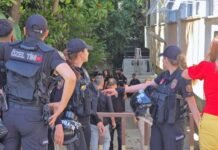
Lt. Col. Levent Türkkan, aide-de-camp of Chief of General Staff Gen. Hulusi Akar, on Monday recanted his previous testimony during a hearing at the Ankara 17th High Criminal Court, where 221 suspects are standing trial for a coup attempt on July 15, 2016, saying he was probably drugged before his testimony, CNN Türk reported.
“It was like we were all living in a dream. I think I was given something [a drug],” said Türkkan, who was accused of being a ringleader of the failed coup attempt.
Türkkan’s first testimony was key to supporting the Turkish government’s argument that a failed military coup attempt last July was orchestrated by followers of the faith-based Gülen movement in the Turkish Armed Forces (TSK).
Underlining that he could not express what he had been subjected to, Türkkan said photos of him leaked to the press are the most important evidence in providing an explanation.
Türkkan said you can make a person who is not conscious say whatever you want and have them sign it.
Expressing that he could not believe what he said in previous testimony, Türkkan said he had been waiting impatiently to speak at court today.
Lt. Col. Türkkan said he had refused to take a role in the coup.
Several days after the military coup attempt last summer, the state-run Anadolu news agency published Türkkan’s confession, considered to be the highest-level “evidence” that Gülen followers were behind the coup because he said he was a Gülen follower and that he was in contact with Gülen followers during the planning and the execution stages of the coup attempt. According to Türkkan’s initial testimony, he knew about the coup plot a day in advance, on July 14.
Türkkan’s testimony was published by most Turkish media outlets back then along with a photo of him in which he appeared to have been tortured.
In a photo released by Anadolu, Türkkan was seen with bruises and injuries on his face, abdomen, shoulder and hands. In his first testimony, Türkkan said that he asked for a pen and a paper and wrote the testimony while he was waiting at the police station; however, the nature of his injuries would apparently not have allowed him to use a pen.
The Gülen movement is accused by the Turkish government of mounting the coup attempt, but the movement strongly denies any involvement.
One hundred thirty generals and admirals in the Turkish military were either dismissed or suspended as part of the widespread purge following the failed coup attempt in July of last year.
The government has been at the center of criticism for turning the Turkish forces into a political Islamist military in line with the wishes of Turkish autocratic President Recep Tayyip Erdoğan.
In February Defense Minister Işık said 30,000 new recruits would be enlisted in the Turkish military.
A month later Işık declared that the ruling Justice and Development Party (AKP) government had dismissed a total of 22,920 military personnel (6,511 officers and 16,409 cadets) after the coup attempt although the Turkish military stated on July 27 that only 8,651 military members including cadets and conscripts took part in the failed coup.
The Cumhuriyet daily reported in March that the government planned to investigate 90,000 more military personnel over links to the Gülen movement.
“If it was a coup perpetrated by the Gülen movement and 22,920 military personnel were dismissed for their connections to the movement as Erdoğan and the government assert, why did only 8,651 military members participate in the coup?” is a question being asked by critics.
In February, Henri Barkey, director of the Middle East Program at the Washington-based Wilson Center, said that many generals purged by the Turkish government are pro-NATO and pro-American, saying this could create a shift in Turkey-NATO relations.
Contrary to accusations made by President Erdoğan and the Turkish government, the Foreign Affairs Committee of the UK Parliament concluded in March that Gülen and the movement he inspired as a whole were not behind the failed coup in Turkey.
The UK Parliament statement came a week after Germany rejected Erdoğan and the Turkish government’s accusations against the Gülen movement about July 15.
The head of Germany’s Federal Intelligence Service (BND), Bruno Kahl, said Turkey could not convince them that US-based Turkish-Islamic scholar Gülen was behind the failed coup in July.
Similarly, Devin Nunes, chairman of United States House Permanent Select Committee on Intelligence, said he had not seen any evidence showing Gülen’s involvement in the putsch in Turkey.
In addition, a report prepared by the EU Intelligence Analysis Centre (IntCen) revealed that the coup attempt was staged by a range of Erdoğan’s opponents due to fears of an impending purge. (turkishminute.com)














